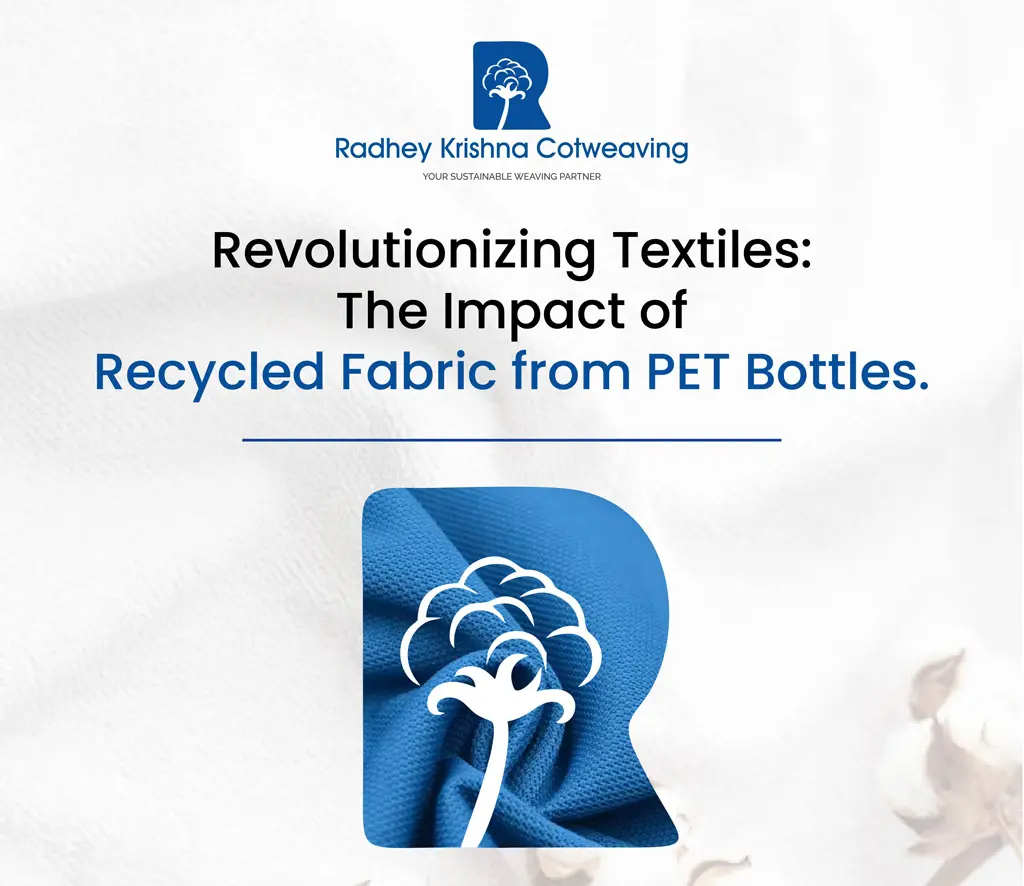- Home
- About
- Products100% Cotton Fabric100% Polyster FabricCotton Polyster BlendJUCO FabricHemp FabricChambray/Yarn DyedDyed Finished Fabric
Single Fill Duck
Army Duck Fabric
Numbered Duck
- 200 GSM Cotton Polyester Mix Canvas Fabric
- 220 GSM Cotton Polyester Mix Canvas Fabric
- 290 GSM Cotton Polyester Mix Canvas Fabric
- 295 GSM Cotton Polyester Mix Canvas Fabric
- 315 GSM Cotton Polyester Mix Canvas Fabric
- 375 GSM Cotton Polyester Mix Canvas Fabric
- 390 GSM Cotton Polyester Mix Canvas Fabric
- 470 GSM Cotton Polyester Mix Canvas Fabric
- Eco Weav
- Re Weav
- Certificates
- Contact Us

Revolutionizing Textiles: The Impact of Recycled Fabric from PET Bottles
In an era where sustainability is no longer optional but imperative, the textile industry is undergoing a transformative shift towards eco-friendly practices. Among the pioneers of this movement is Radhey Krishna Cotweaving, a leader in producing recycled fabric from PET bottles.
With prestigious certifications like the Global Recycled Standard (GRS) and Recycled Claim Standard (RCS), Radhey Krishna Cotweaving exemplifies the integration of environmental stewardship with cutting-edge textile manufacturing.
Radhey Krishna Cotweaving’s Certifications and Standards
Achieving GRS and RCS certifications marks a significant milestone for Radhey Krishna Cotweaving, underlining its commitment to sustainable production practices. These certifications ensure that the textiles produced meet stringent criteria for environmental and social responsibility throughout the supply chain.
They confirm that Radhey Krishna Cotweaving maintains high standards of traceability, ensuring that every step of the production process, from the sourcing of recycled bottles to the final fabric, adheres to the highest ecological and ethical standards.
How Recycled Fabric from PET Bottles Is Made
The process of converting PET bottles into fabric involves several key steps. Initially, collected PET bottles are cleaned and shredded into small flakes. These flakes are then melted and extruded into fibers, which can be spun into yarns and woven or knitted into fabrics.
Radhey Krishna Cotweaving employs state-of-the-art technology to ensure this process is efficient and environmentally friendly. The result is a durable, versatile fabric that is ideal for various applications, including clothing, bags, and home textiles.
The Role of GRS and RCS in Ensuring Quality and Sustainability
The Global Recycled Standard (GRS) and Recycled Claim Standard (RCS) play vital roles in the textile industry by setting benchmarks for sustainability. GRS certification, in particular, is not just about recycled content but also about adhering to environmental and social practices in production. These include reducing energy and water consumption, minimizing chemical use, and ensuring safe and fair working conditions.
RCS focuses on verifying the recycled content of the fabric. Together, these standards help companies like Radhey Krishna Cotweaving prove that our fabrics are genuinely sustainable and produced responsibly.
Benefits of Using Recycled Fabric in Fashion
Adopting recycled fabric from PET bottles in the fashion industry offers numerous benefits. For one, it promotes a circular economy, reducing dependency on new resources and enhancing the lifecycle of materials.
Secondly, fabrics from recycled PET retain the aesthetic and functional qualities of traditional textiles, ensuring that style and sustainability can coexist.
Designers and consumers do not have to compromise on quality or fashion sense when choosing recycled fabrics, making them a compelling choice for the environmentally conscious.
Radhey Krishna Cotweaving’s Commitment to Innovation and Sustainability
Radhey Krishna Cotweaving is not just manufacturing textiles; they are redefining what it means to be a fabric manufacturer in the 21st century. Our dedication to innovation in recycled materials and sustainable practices places us at the forefront of the textile revolution. By continuously seeking to improve and expand our sustainable product lines, we remain a key player in driving the industry towards eco-friendly solutions.
Conclusion
Act Now: Choose Sustainable Textiles
Join Radhey Krishna Cotweaving in transforming the textile industry by choosing recycled fabrics for your next project. Whether you are a fashion designer, a product manufacturer, or a consumer, your choice to support sustainable textiles can make a significant impact. Contact us today to explore our innovative and eco-friendly fabric options and take a step towards a more sustainable future in fashion.

